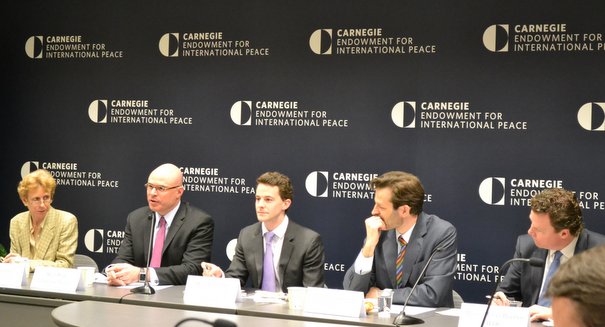Registration
Thank you!
You will receive an email confirming your registration.
The Carnegie Endowment for International Peace hosted a discussion on transatlantic energy security. Members of the European Parliament’s Industry, Research, and Energy Committee (ITRE) met with D.C. based researchers and congressional staffers to discuss the prospects of a European Energy Union. Carnegie’s David Livingston moderated the discussion, which was held under the Chatham House Rule.
Discussion Highlights
- The Global Energy Market: Discussants noted the impact both of low oil prices and preexisting trends on oil producers and consumers.
- Demand: Demand for energy is growing within non-OECD countries. In China, mass demand for new cars is spurring a large demand for distillates and light oils. Europe, on the other hand, is much less demand-responsive to price shocks given high levels of fuel taxation that damper price effects.
- Supply: The insufficient replacement of reserves worldwide, in conjunction with the rapid depletion rates associated with unconventional resources such as shale, will give large oil companies that have made strategic long-term investments more leverage in the future, as today’s low oil price sets the stage for insufficient investment in the future.
- Refineries: Although refineries worldwide are having a renaissance, European refiners are losing out. Traditional European crude oil supplies from the Middle East are now going to new Middle Eastern refineries, creating a need for a new source of crude oil that the United States could provide, should it choose to lift its de facto export ban.
- Demand: Demand for energy is growing within non-OECD countries. In China, mass demand for new cars is spurring a large demand for distillates and light oils. Europe, on the other hand, is much less demand-responsive to price shocks given high levels of fuel taxation that damper price effects.
- Energy Security: Discussants agreed on the importance of reducing the European Union’s dependence upon Russian energy. However, differences in the priorities of EU member states raise questions about the potential to transcend a “lowest common denominator” approach to creating an Energy Union.
- Dependence on Russia: Concerns about Russia center on issues of security and pricing—both of which were heightened by the vulnerability of gas supply to conflict in Ukraine. Six out of twenty-eight EU member states are highly dependent on Gazprom for their natural gas.
- Dependence on Russia: Concerns about Russia center on issues of security and pricing—both of which were heightened by the vulnerability of gas supply to conflict in Ukraine. Six out of twenty-eight EU member states are highly dependent on Gazprom for their natural gas.
- Energy Union: In Brussels, there is widespread interest in creating a European Energy Union. While Eastern European countries such as Poland and Latvia are eager for an energy union due to tensions with Russia, Western European countries do not feel the same urgency. The potential to create a sense of urgency in Western Europe is limited; as even the heightened tensions surrounding the crash of Malaysian Airlines Flight 17 did not create a drive for the Netherlands seriously drive diversification away from Russian gas. Reconciling this divide should be the priority of the European Energy Security agenda, discussants asserted.
- European Priorities: Europe has a number of priorities, including reducing dependence on Russia, building infrastructure, expanding renewables and energy efficiency, research and development, reducing energy poverty, and job creation. Discussants held different views on how to prioritize these interests and how to balance short-term interests and longer ones. In a period of high oil prices, the renewable energy, climate, and energy security agendas tend to converge. But in a period of low oil prices, these agendas tend to diverge. Ultimately, discussants said, renewables are attractive when the long-term view is prioritized, but their appeal is decreased when proximate crises are most salient.
- European Priorities: Europe has a number of priorities, including reducing dependence on Russia, building infrastructure, expanding renewables and energy efficiency, research and development, reducing energy poverty, and job creation. Discussants held different views on how to prioritize these interests and how to balance short-term interests and longer ones. In a period of high oil prices, the renewable energy, climate, and energy security agendas tend to converge. But in a period of low oil prices, these agendas tend to diverge. Ultimately, discussants said, renewables are attractive when the long-term view is prioritized, but their appeal is decreased when proximate crises are most salient.
- The U.S. Role in Trans-Atlantic Energy Security: Discussants agreed that Europeans would perhaps benefit from importing U.S. crude oil more than LNG. However, from the U.S. perspective, the case for lifting the U.S. crude oil export ban is still questionable. They added that the Energy Union would need to be comprehensive and coherent in order for stakeholders outside of Europe, like the United States, to be interested.
- Key Takeaways and Questions: Europe inherently has different interests among its member states. Reconciling these different interests will be the biggest challenge in the formation of an Energy Union, discussants agreed. States that take the long-term view are more likely to win out because investments in infrastructure are inherently long term, and when prudently made, can enhance the options available to market participants and policymakers in the face of uncertainty.
